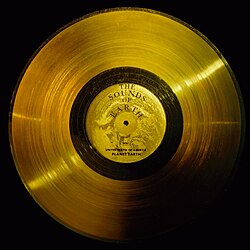Voyager 1 is on the doorstep of interstellar space; as of a few weeks ago, it probably became the first man-made object to leave the solar system. Besides instruments and a big antenna, it also carries a bunch of stuff meant to help whoever finds it understand the people who built it. In other words, humanity.
Of course, that's a tall order, summing up several billion people. But we gave it a good shot. There's a kind of dust jacket describing humanity:
... and a gold-plated record inside that included sounds, messages and data from all corners of the world:
The music on the disc--images were also encoded--is what I find most interesting about all the inclusions. In terms of music, it featured recordings of many genres and nationalities from throughout history (listen here). But even that turned out to be just a snapshot, not a sampling. Hip-hop, a form of music popular around the globe in 2012, barely existed in 1977, when Voyager 1 was launched (and almost certainly did not exist in the record collections of the probe's creators). Same with modern electronic music, and I'm sure many others that people more plugged in than I could tell you about.
In the end, it's all fairly academic. Even if some alien race were to come across Voyager 1 tomorrow, the civilization they would find on Earth would, culturally speaking, be in a much different place than what the record depicts. Some things about humanity are universal--basic shape, expressions, nourishment. Some aspects of culture will endure; Mozart's work, the pop music of his generation, is still moving audiences hundreds of years later. And of course, the odds that an extraterrestrial civilization not only notices Voyager but traces its footsteps are infinitesimal to begin with.
But if they do, I guess there are a lot worse problems than the aliens thinking Chuck Berry is our president.
Of course, that's a tall order, summing up several billion people. But we gave it a good shot. There's a kind of dust jacket describing humanity:
Not out of place on a Pink Floyd album.
... and a gold-plated record inside that included sounds, messages and data from all corners of the world:
The hottest record in the galaxy.
The music on the disc--images were also encoded--is what I find most interesting about all the inclusions. In terms of music, it featured recordings of many genres and nationalities from throughout history (listen here). But even that turned out to be just a snapshot, not a sampling. Hip-hop, a form of music popular around the globe in 2012, barely existed in 1977, when Voyager 1 was launched (and almost certainly did not exist in the record collections of the probe's creators). Same with modern electronic music, and I'm sure many others that people more plugged in than I could tell you about.
In the end, it's all fairly academic. Even if some alien race were to come across Voyager 1 tomorrow, the civilization they would find on Earth would, culturally speaking, be in a much different place than what the record depicts. Some things about humanity are universal--basic shape, expressions, nourishment. Some aspects of culture will endure; Mozart's work, the pop music of his generation, is still moving audiences hundreds of years later. And of course, the odds that an extraterrestrial civilization not only notices Voyager but traces its footsteps are infinitesimal to begin with.
But if they do, I guess there are a lot worse problems than the aliens thinking Chuck Berry is our president.




No comments:
Post a Comment